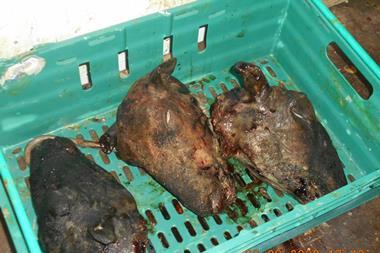
The Food Standards Agency’s National Food Crime Unit (NFCU) gained new investigatory powers on 1 May.
Tackling food fraud supports honest businesses and keeps consumers safe. It means legitimate businesses can grow, and consumers are protected from rogue criminal operators.
The NFCU, established in May 2015 as part of the FSA, set itself clear strategic objectives: to prevent food being rendered unsafe or inauthentic through dishonesty, to disrupt offending and bring offenders to justice, and build global and domestic capability to counter food crime. So why are we gaining new powers?
Safety after horsegate
Following the 2013 horsemeat scandal, the Elliott Review identified the need for more capability to prevent food crime. Over the past decade, we’ve seen further threats to food safety and authenticity. More recently, supply chains have been disrupted by global events such as the pandemic, poor harvests, and war in Ukraine.
Despite these challenges, we can be confident that food in the UK remains safe and is what it says it is, and that consumer confidence in the safety and authenticity of food is high, enabling British businesses to flourish.
This doesn’t happen by itself. There are many layers to the prevention of food crime in England and Wales. Businesses are the first line of defence with a legal responsibility to sell food that is safe, supported by local authorities (LAs) and the FSA.
The NFCU has made significant strides. Our team has carried out crucial work disrupting food crime, including:
- Custodial sentences following an investigation into the theft of £300,000 of chicken
- The arrest of five men following the discovery of a substantial quantity of allegedly illegal meat
- The conviction of a drug dealer selling lethal substances including 2,4-dinitrophenol (DNP) on the dark web
- The successful conviction of a business and four men in Southwark for diverting meat unfit for human consumption back into the human food chain.
Removing roadblocks
Recent NFCU operational activity has highlighted not having access to certain powers can create a significant disadvantage in tackling food fraud. This is why we have worked to enhance our investigative capabilities by gaining powers under the Police and Criminal Evidence Act and Criminal Justice and Public Order Act.
The new powers will enable NFCU investigators to apply for and execute search warrants, and ensure swift action is taken to tackle food fraud. Crucially, they enable us to be more effective in protecting consumers and legitimate businesses.
Organisations and individuals work hard along the food chain to protect the integrity of British food and enable growth within the UK economy. The powers will give industry, partners and consumers increased confidence that we can act more quickly to aid the prevention and prosecution of food crime locally and nationally.
While these enhanced powers do not include powers of arrest, they will relieve the existing burden from external partners such as the police and ocal authorities, who we will continue to work with very closely.
Increased powers are a key milestone in the NFCU’s tenth year, and the 25th anniversary of the FSA. As always, our officers will tackle food fraud and seek to prosecute those in food supply chains who act dishonestly for their own benefit.
Together with our local authority partners, we’ll support industry to continue do the right thing, protecting legitimate businesses and consumers.
Andrew Quinn, head of the National Food Crime Unit



















No comments yet